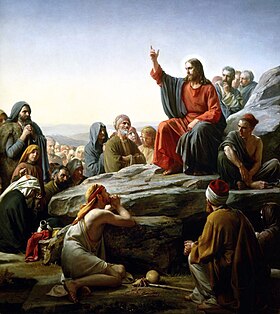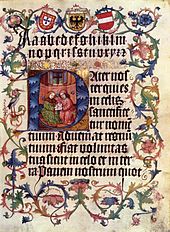Sermon on the Mount
The Sermon on the Mount (anglicized from the Matthean Vulgate Latin section title: Sermo in monte) is a collection of sayings spoken by Jesus of Nazareth found in the Gospel of Matthew (chapters 5, 6, and 7)[1][2] that emphasizes his moral teachings.
[citation needed] This sermon is one of the most widely quoted sections of the canonical gospels,[3] including some of the best-known sayings attributed to Jesus, such as the Beatitudes and the commonly recited version of the Lord's Prayer.
Although the issues of Matthew's compositional plan for the Sermon on the Mount remain unresolved among scholars, its structural components are clear.
[10] In almost all cases, the phrases used in the Beatitudes are familiar from an Old Testament context, but in the sermon Jesus gives them new meaning.
[22] In Matthew 6, Jesus condemns doing what would normally be "good works" simply for recognition and not from the heart, such as those of alms (6:1–4), prayer (6:5–15), and fasting (6:16–18).
[28] Various religious and moral thinkers (e.g. Leo Tolstoy and Mahatma Gandhi) have admired its message, and it has been one of the main sources of Christian pacifism.
[1][29] In the 5th century, Saint Augustine began his book Our Lord's Sermon on the Mount by stating: If anyone will piously and soberly consider the sermon which our Lord Jesus Christ spoke on the mount, as we read it in the Gospel according to Matthew, I think that he will find in it, so far as regards the highest morals, a perfect standard of the Christian life.The last verse of chapter 5 of Matthew (Matthew 5:48)[30] is a focal point of the Sermon that summarizes its teachings by advising the disciples to seek perfection.
[32][better source needed] The teachings of the sermon are often referred to as the "Ethics of the Kingdom": they place a high level of emphasis on "purity of the heart" and embody the basic standard of Christian righteousness.
[8][34][35] Jack Kingsbury and Hans Dieter Betz see the sermon as composed of theological themes, e.g. righteousness or way of life.
[7] The Catechism of the Catholic Church suggests that "it is fitting to add [to the Sermon on the Mount] the moral catechesis of the apostolic teachings, such as Romans 12-15, 1 Corinthians 12-13, Colossians 3-4, Ephesians 4-5, etc.
"[36] A central debate over the sermon is how literally its high ethical standards are meant to be applied to everyday life.




